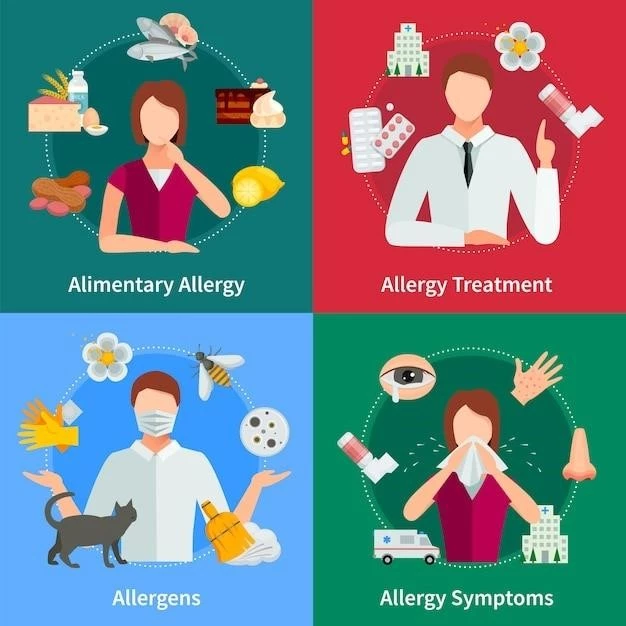Understanding Allergic Angiitis
Causes of Allergic Angiitis
Understanding the causes of allergic angiitis is crucial. Common triggers include medications‚ infections‚ and environmental factors. Consult with a healthcare professional to identify and address potential causes.
Causes of Allergic Angiitis
Understanding the causes of allergic angiitis is key to effective management. Potential triggers may include reactions to certain medications like nonsteroidal anti-inflammatory drugs (NSAIDs) or infections like hepatitis B or C. Environmental factors such as allergens can also play a role. It is essential to work closely with a healthcare provider to pinpoint the specific cause in each individual case.
Moreover‚ genetic predisposition and autoimmune responses are believed to contribute to the development of allergic angiitis. Identifying and avoiding triggers‚ along with proper medical guidance‚ can help reduce the risk of exacerbating symptoms and improve overall outcomes for those affected by this condition.
Symptoms and Diagnosis of Allergic Angiitis
Recognizing the symptoms of allergic angiitis is crucial for timely diagnosis and treatment. Symptoms can vary but may include fever‚ weight loss‚ fatigue‚ muscle aches‚ nerve problems‚ skin rashes‚ and organ-related issues such as kidney damage. If experiencing persistent symptoms‚ seek medical attention promptly.
Diagnosing allergic angiitis often involves a combination of medical history assessment‚ physical examinations‚ laboratory tests‚ imaging studies‚ and sometimes a biopsy of affected tissues. It is important to communicate openly with healthcare professionals about your symptoms and concerns to facilitate an accurate diagnosis and appropriate treatment plan.
Treatment Options for Allergic Angiitis
Effective treatment for allergic angiitis typically involves a combination of medications to suppress the immune system and reduce inflammation. Corticosteroids like prednisone are commonly prescribed to manage symptoms and control the disease process. In some cases‚ immunosuppressants such as cyclophosphamide or methotrexate may be used.
It is crucial to follow your healthcare provider’s treatment plan diligently and attend regular follow-up appointments to monitor your response to medications and adjust the treatment as needed. Additionally‚ lifestyle modifications like maintaining a healthy diet‚ staying physically active‚ and avoiding known triggers can complement medical therapy and support overall well-being.
Complications of Allergic Angiitis
Complications of allergic angiitis can vary in severity and may affect different organs and systems in the body. Some common complications include renal (kidney) involvement leading to kidney failure‚ nerve damage causing neuropathy‚ skin ulcers‚ gastrointestinal issues‚ and cardiovascular problems.
It is crucial to be aware of these potential complications and work closely with your healthcare team to monitor and manage them effectively. Seeking prompt medical attention in case of new or worsening symptoms is essential to prevent complications from progressing and ensuring the best possible outcomes for your health.

Managing Allergic Angiitis Flare-Ups
Managing flare-ups of allergic angiitis requires a proactive approach to control symptoms and prevent disease progression. It is important to closely follow your prescribed treatment plan‚ which may include medications to reduce inflammation and suppress the immune system.
Additionally‚ maintaining open communication with your healthcare provider is essential. Keep track of your symptoms and report any changes promptly. Engaging in stress-reducing activities‚ adopting a healthy lifestyle‚ and avoiding known triggers can also help minimize the frequency and severity of flare-ups.
Research Updates on Allergic Angiitis
Staying informed about the latest research updates on allergic angiitis can be beneficial for both patients and healthcare providers. Recent studies have focused on advancing treatment options‚ understanding disease mechanisms‚ and identifying potential new therapeutic targets.
By keeping up-to-date with current research findings‚ patients may gain insights into emerging treatments or clinical trials that could offer novel approaches to managing their condition. Engaging in discussions with healthcare professionals about these research updates can facilitate informed decision-making and potentially enhance treatment outcomes.
Lifestyle Changes for Allergic Angiitis Patients
Implementing certain lifestyle changes can help manage allergic angiitis and promote overall well-being; Maintaining a balanced and nutritious diet rich in fruits‚ vegetables‚ whole grains‚ and lean proteins can support your immune system and reduce inflammation.
Regular physical activity tailored to your abilities can improve circulation and enhance your overall health. Adequate rest and stress management techniques such as meditation or yoga can also be beneficial. Avoiding smoking and minimizing alcohol consumption can contribute to better outcomes.
Differences Between Allergic Angiitis and Other Vasculitis Disorders
Understanding the nuances between allergic angiitis and other vasculitis disorders is important for accurate diagnosis and appropriate treatment. While vasculitis conditions share inflammation of blood vessels‚ they differ in terms of underlying causes‚ affected organs‚ and disease courses.
For example‚ allergic angiitis specifically involves an allergic or hypersensitivity reaction‚ leading to inflammation in blood vessels. In contrast‚ other vasculitis disorders like giant cell arteritis or granulomatosis with polyangiitis have distinct immune system abnormalities as primary drivers.
Consulting with a specialist knowledgeable in vasculitis can help differentiate between these conditions‚ ensuring a tailored approach to management that addresses the unique characteristics of each disorder.
Conclusion
In conclusion‚ understanding allergic angiitis is essential for effective management and improved quality of life. By recognizing the causes‚ symptoms‚ and treatment options for this condition‚ individuals can work towards better health outcomes.
Embracing lifestyle changes‚ staying informed about research updates‚ and collaborating closely with healthcare providers are vital steps in coping with allergic angiitis. By taking a proactive approach and adhering to prescribed treatments‚ patients can navigate the challenges of this disease with resilience and empowerment.
Remember‚ each case of allergic angiitis is unique‚ and personalized care is key to successful management. By prioritizing self-care‚ seeking support from medical professionals‚ and staying educated‚ individuals can strive towards achieving optimal health and well-being while living with allergic angiitis.
